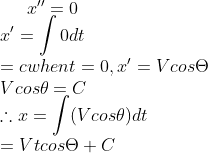hey guys,
didn't listen properly in class
cannot even understand this proof .....
HELP D:
for horizontal motion...

etc etc
BUT WHERE DOES THAT "t" come from??! when you integrate Vcos(theta)??
edit: oops sorry about crappy latex typing ><
didn't listen properly in class
cannot even understand this proof .....
HELP D:
for horizontal motion...
etc etc
BUT WHERE DOES THAT "t" come from??! when you integrate Vcos(theta)??
edit: oops sorry about crappy latex typing ><
